Milly
Leaves Home to Work, 1933-1942
“But Mr. Darby, I’m so worried. What is Mrs. Mason like? And will she like me?”
The new Austin putted along the narrow lane to the great city of London, where I was to enter my first job away from home.
“Milly, dear, you are such a pet, no one could help but love you. Mrs. Mason is a cultured English lady who has had a tragic thing happen to her.”
Mr. Darby, the head of the home where Grace worked, slowed the car around a sharp curve. He and his wife had offered me a ride to their neighbor, who was my new employer, in London.
“A few years ago her husband abandoned her for a young secretary. Since then she has been consumed with shame and hatred.” He paused, then continued, “She has removed every memory of him from her home and life: pictures of him have all been destroyed. Her problem is that Graham, their youngest son, looks and often acts just like him. However, Jeffrey, the oldest, has her features and mannerisms.”
I twisted my handkerchief into knots as I wondered how I would fit into Mrs. Mason’s circumstances.
Mr. Darby changed the subject. “I have heard of a position in London that sounds perfect for your father’s talents. Coulsdon Purley Council is looking for a gardener.”
“Oh, how wonderful! Then I would be able to see them on my days off!”
Before I knew it Mr. Darby parked the car in front of a big home that stood apart from the rows of houses that lined other London streets.
“Well, here we are! This is the Mason house!” Everything seemed formidable, except the flowers that smiled a welcome to me from the front yard. Mr. Darby ushered me up the front steps.
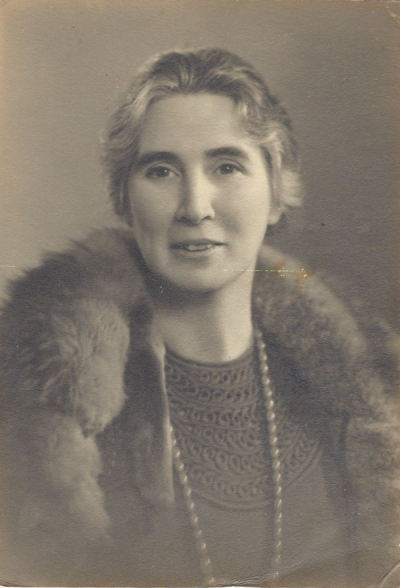
MS. MASON
An elegant lady met us at the door. She stretched out her fair hand and shook my damp palm. “I’m Mrs. Mason, and I’m delighted to meet you. I know we shall get along well. I have heard many nice things about you.”
From behind her skirt I saw the mischievous eyes of a little boy with a tussled mop of brown hair. “Graham, quit hiding!” Mrs. Mason said sternly. The little head disappeared.
“Never mind. Now that you are here Milly, things should improve. I understand that you have a remarkable way with little boys. Please come in, and we’ll take your bag right upstairs to your bedroom.”
Mr. Darby excused himself and left for an appointment. With a lump in my throat I waved as the Austin disappeared around the corner. Mrs. Mason led me up the stairs. “I hear you come from a big family. You will miss them, of course, but I hope that you will enjoy being with the boys and me.” Her kind words gave me courage.
My bedroom was lovely with lace curtains and fine furniture. As I walked around in awe Mrs. Mason pointed through the open window to a large home up the street. “That is the Darby’s residence where your sister Grace works. I believe that the top window facing yours, is her room.”
Just then a loud “thump” sounded from downstairs. Mrs. Mason looked heavenward and her mouth tightened. “He’s incorrigible,” she said. She turned and walked to the doorway. “Graham! You know those toys are not to come upstairs. Take them outside immediately!” The noise receded with the little boy’s footsteps.
“Your main job Milly, will be to keep track of Graham. You will find him difficult at best. Jeffrey is older and much easier. I understand that you are very good with your brother, and that is how I want you to be with my boys. ”
“Thank you, I will enjoy that,” I assured her, since I had already fallen in love with the little truant during the few glimpses I’d had of him.
“Let’s go down and discuss my other expectations over a cup of tea. You can settle in later this afternoon.”
We drank a cup of tea in the sunny kitchen and talked about food and how she wanted it prepared; the house, and what duties I was to perform in its upkeep. It occurred to me that Mrs. Mason did not intend me to be a servant but a helper, and if I fit in, a part of the family.
“I bathe in the morning, and you may bathe in the afternoon. I expect you to take a two-hour rest every afternoon.”
“Oh, but I don’t need a rest. I keep busy all day!”
“Well, here you will have two hours during the day to yourself. I advise that you use them to rest. When the boys get in from school you will need your wits about you. Jeffrey gets in at five and Graham at three-thirty.”
She glanced into the back yard and frowned as Graham stacked his toys, then like a mountaineer, stood on top of the heap and waved his hands.
“Did you say I could treat the boys as my own brothers?”
“Please, they will enjoy it!”
I collected our empty teacups and took them to the sink. Mrs. Mason returned the biscuit tray to its shelf.
“If I need you, Milly, I will ring this little bell.” She showed me a dainty china bell that had a pleasant chime to it. “I despise shouting and loud noises.”
Suddenly we heard a terrific din. We looked outside. Graham was throwing his stack of toys at a metal bucket. To save his mother’s nerves I slipped out the back door and called his name.
“Hello Graham. Come and meet me!”
He shuffled over. “Mummy says I’m a no-good ruffian,” he announced, “so I am!”
“Well, let me look at you. I know quite a lot about little boys. Hmmm, let’s see now.” I turned him slowly around and examined him. “Yes, hmmmmm. I would say, yes indeed, I would say that you are… smart. Am I right?” I asked as I continued with my inspection, “and clever, and fun, and the nicest little boy in this whole neighborhood!” By this time his mouth was open and his eyes were wide.
“I like you,” he whispered. Graham and I were inseparable from then on. I woke him each day, made his breakfast, walked him to school and met him again in the afternoon. We played games and took long walks. I helped him with his homework, made sure he bathed and that he kissed his mother before bedtime. Each night I read him a story or two, sang a song, prayed a prayer and gave him a big hug before I turned out his bedroom light.
Mrs. Mason gave me every Wednesday and Sunday afternoon off to spend with my sisters. Mr. Darby, true to his word, had found my father the job in Coulsdon, so my sisters and I regularly went to visit our parents. Our father was happy with his work and with his welcome at the Coulsdon Baptist church where he was often asked to teach the Sunday school classes.
One Sunday afternoon Gladys, Grace, Elsie, Ruth and I all arrived at our parents’ home for afternoon tea. Gladys was in her second year of Bible school and often brought other Bible school students home to tea. This time she arrived alone, which the rest of us preferred.
“Oh Mummy, it is so nice to see you!” I hugged my dear mother. “Where’s Daddy?”
“He was invited to speak to the afternoon Young Men’s Class at church. It should be over soon and he’ll be home. He‘s enjoying ministering again.”
“Does he still pray and read his Bible in the rose garden like he did back at the Gordon-Brown estate?”
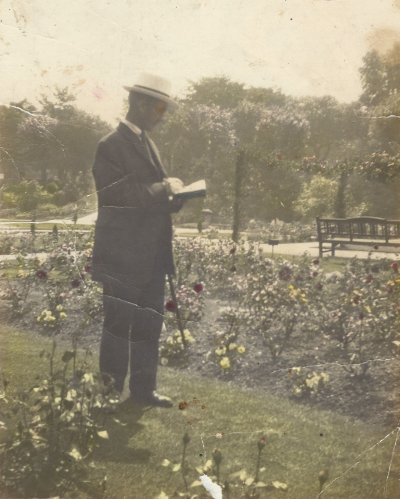
MILLY’S DAD IN THE GARDEN
Before I got my answer I glanced out of the window and saw my father coming down the sidewalk with at least eight young men following behind. “Mother! What is this?”
“What, dear?” mother came to the window and watched as father turned into the yard. “Daddy must have invited his class home. That’s unusual. Hurry Milly! I’ll answer the door and you and your sisters do something in the kitchen!”
I dashed for the kitchen where my sisters had started to put our meal together. ”Daddy’s brought company home! Get another pot of tea going and bring out Mummy’s cake tin.”
“Who are they,” asked Grace, “the minister and his wife?”
“It looks like the group of young men Daddy’s teaching.” I brought more bread for Elsie to slice.
Ruth peeked into the entryway through the crack in the kitchen door. “There are nine young men!”
John, our little brother, swung the door wide open as he entered the kitchen. “Looks like Father’s brought you each home a husba…” Grace cupped her hand over his mouth. I quickly swung the door closed. Elsie nearly fainted, and Gladys tried hard not to laugh hysterically.
Mother appeared at the kitchen door. “John, pick some berries from the garden. Girls, as soon as the food is ready, bring a tray into the dining room. Daddy wants to introduce you.”
“Would it be asking too much, Mummy, if we prepared the food and you served it?” Elsie asked.
“No. Father asked that each of you come out.” She returned to her job as hostess.
“All right, you go first, Gladys.” Grace gave the sandwich tray to her older sister and grabbed the teapot. Elsie took up the sugar bowl and creamer and was at Grace’s heels. Ruth had the cake platter and was out the door behind Elsie. I saw I had nothing to carry. Then the back door banged shut. John entered with a basket of berries. His mouth was pink. “Are they good, Johnny?” All he could do was nod, as he was chewing a juicy berry. I took the basin of fruit from him, rinsed the berries and arranged them on a plate.
When I entered the dining room, I noticed that the young men were on their feet and the last one had just given Ruth a handshake. I turned a few shades of pink when Daddy announced, “This is my youngest daughter, Milly.”
I managed to shake each hand timidly, and sat down where mother directed. I glanced across the table and caught a twinkle in the eyes of a curly-headed boy, Edward Ware.
Daddy’s guests stayed for an hour. As they were leaving, Grace and I cleared the table. I turned with an arm full of plates and found myself face to face with young Mr. Ware. “Excuse me, but would you come to church with me next week?” he asked.
I nearly dropped the plates back onto the table and felt my cheeks warm up. “Why…yes, I could do that.”
After he left I berated myself, Why did I say that I would go? I don’t even know him! He might not even be a Christian. (I had been taught strictly to never go out with a boy unless he was a Christian.) But why would Daddy bring him home if he weren’t? He attends the Bible class!
The next Sunday I wore my best dress and fidgeted with my hands as Grace and I traveled back to our parents’ home. “Milly, you seem nervous. Did you have a hard week at Mrs. Mason’s?”
“No,” I answered. “One of Daddy’s Sunday afternoon Bible class boys asked me to go to church with him this week, and I said that I would.”
A few months earlier a young man, Percy, at the Pentecostal church was interested in me. When Grace found out, she had reacted like a mother hen and worried me constantly with advice.
As I expected, Grace asked, “Is he born again, Milly? Make sure that he doesn’t get too close to you!” She continued to preach to me until he arrived. I whisked him out the door, immediately.
“It’s a pretty day, isn’t it?” I remarked as the front door closed behind us.
“Yes, it is.” He took up the conversation, and began asking about my work and telling me about his job. On the way home from church we continued to learn about one another. He said that I could call him ‘Eddie’ as his parents did, instead of ‘Edward’, as the boys did. I liked his gentlemanly manner and his knowledgeable, bright outlook on things. As we approached my parents’ gate he asked if he could accompany me again the next week. “Yes,” I conceded. He smiled and his eyes shone.
We attended the Baptist church together for three weeks. I enjoyed his attention. In our conversations I noticed that he never brought up Bible topics. This concerned me since each week Grace quizzed me about whether he was truly a Christian. And also Mrs. Mason warned me, “You don’t want to be going out with that young man too often.”
The following week I asked Eddie if he would attend my church for a change. He seemed a little reluctant, but agreed.
That Sunday, as we entered my church, a Pentecostal Church, many people smiled at Eddie and shook his hand. When the service commenced Eddie joined in the hymns, but did not seem to know many of the choruses. As the minister prepared to speak, we gave him our undivided attention. He spoke on “Hell.” Eddie started to perspire. At the end of the sermon the speaker invited anyone who wished to become a Christian to raise his hand. Eddie raised his arm up immediately. All the way home his face was radiant, and he was so excited that he could hardly sit still on the bus seat. “Oh, Milly! I’m saved! Really and truly saved from that horrible place of hell!”
From then on Grace became fond of Eddie and always made him welcome. On my days off we spent many hours together, walking or biking for miles over the beautiful English Downs. “Do you mind if I hold your hand?” Eddie asked me one delightful day.
“It would be all right,” I answered. We shared our dreams and hopes and plans for the future as we walked.
One Wednesday he invited me to attend his church since there was to be a guest missionary speaker. We sat together in one of the front row seats and listened intently to a white-haired lady make Africa and its natives come to life.
“These fields of human souls are white already to harvest,” she told us. John 4:35 was her text. Edward’s hand clutched mine as the earnestness of her appeal stirred our hearts. She asked if anyone wanted to dedicate their lives as laborers in God’s great mission field. We responded, and walked hand in hand down the aisle to answer the appeal and to have her pray for us. When we left the church that night we knew we would never forget the speaker, Miss Alma Doering.
Eddie started to read every book he could get his hands on about missionaries and foreign countries, particularly the continent of Africa. He read of leprosy colonies where people’s hands, noses and feet fell off; of cannibals who had an appetite for white missionary stew; of snakes and lions that tried to share space in missionaries’ grass-roofed shacks; of alligators and rhinoceroses that tipped missionary boats over. As we discussed these future difficulties it appeared to me that Eddie’s biggest concern was whether I would be able to handle my part. “Now Milly, are you sure that you won’t mind washing clothes in a river?”
“I will have a native worker come with me and shout if she sees alligators, just in case I’m too busy washing,” I assured him.
“And what about sewing? Can you make me shirts?” He was worried that his clothing would wear out and mosquitoes and leeches would then feast on his exposed flesh.
“Eddie, I have been sewing since I was little, and I will bring a whole packet of needles and several spools of thread when we go.”
We met a retired missionary from Africa, Dr. Morton, and spent many Sunday afternoons in his home, listening breathlessly to his missionary experiences. On one occasion an inch-and-a-half long June bug crawled past Dr. Morton’s chair as he told one of his stories. Without a hesitation in his voice, he picked the insect up between his thumb and forefinger and squeezed it until it popped, then he flicked it into the fire.
Our young English sensibilities were shaken to their depths. As we walked home, awed by what we had witnessed, I asked, “Eddie! Do you think that you’ll be able to do that to bugs?”
“I’m not sure, but at least he didn’t eat it!”
As the months passed it became obvious that we could not leave for the foreign mission field immediately. Not only were we not prepared to deal with bugs, but no opportunity opened to us. We were told that we were too young, too poor, and too needed where we were. Also, Eddie’s job was more demanding. At that time Mrs. Mason required more of my time, so Eddie and I saw less and less of each other.
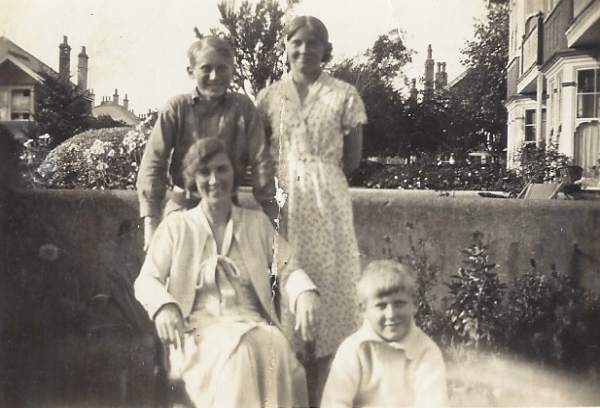
I thoroughly enjoyed life at the Masons although my heart ached for Graham. It hurt as I saw him and his mother grow farther apart.
The final cruel blow came when Mrs. Mason called me and announced, “I am going to send Graham to a boarding school.” Her bitterness would now inflict more hurt and pain upon an innocent boy.
“But Mrs. Mason, why?”
“He needs a better education.”
“Is Jeffrey going, too?” I inquired.
“No, of course not. Jeffrey is in track and enjoys where he is, so I wouldn’t consider it.” I bit my lip to hold back the tears.
Mrs. Mason made the arrangements for his departure. “I shall miss you, Milly,” Graham told me as he sat on the edge of my bed the day before he was to leave.
“And I you.” Tears ran down my cheeks.
“I shall write to you every week,” he promised, “and tell you all about what I’m doing.”
True to his word, he wrote to me every week. Since he never corresponded with his mother, she read my letters to learn how he was adjusting and performing in his schoolwork.
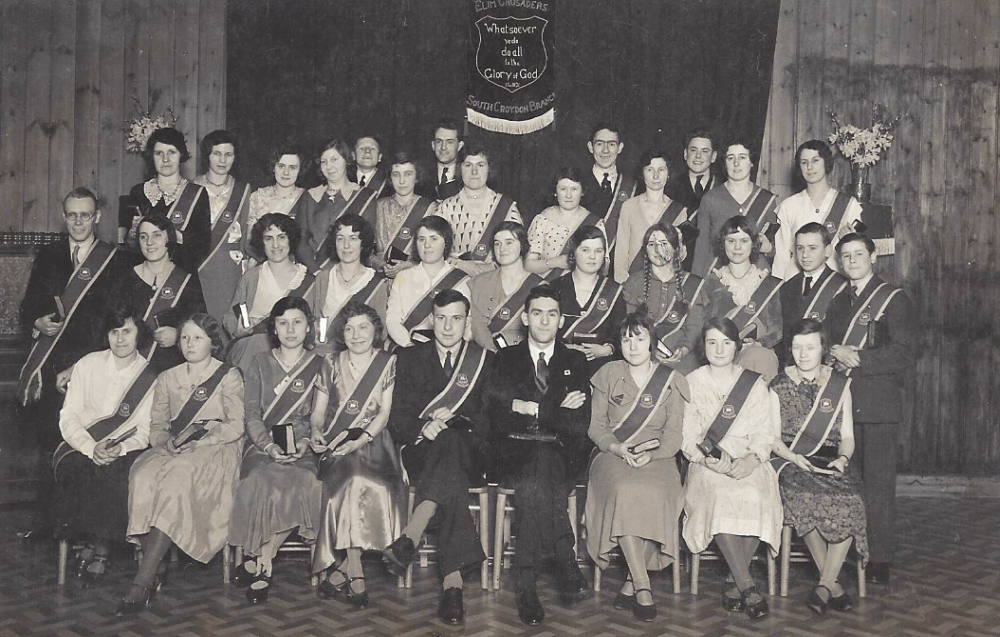
After Graham left, I took over other jobs for Mrs. Mason. I went to the bank, ran errands, cooked meals, helped to entertain, and cleaned house. My employer was always kind and appreciative of my efforts. In the afternoons she played the piano and lulled me to sleep with the classics. In the evenings she helped me learn my alto part for the Elim Church Choir. My sisters and I all sang in the church choir. In January the Elim choirs across the country were assigned to practice a regimen of songs, which were chosen by the main choir in London. Triumphant hymns, like,
and,
Guide Me,
Royal Albert Hall 2013
These hymns were sung across the country in small groups until the Monday after Easter, a national holiday. On that date, all of the congregations converged in London’s Royal Albert Hall, composing a choir of thousands. Ronald Cooper, a gifted organist, played the huge pipe organ, which vibrated like thunder with angelic majesty. The mass choir, dressed in white with wide, blue ribbons across our chests, sang each of the three services. A baptismal service followed the final service.
“Grace, I want to be baptized,” I announced resolutely on the second day of the meetings.
“Wonderful, Milly! The Bible says very clearly that we should be baptized. Acts 2:38, Repent and be baptized every one of you in the name of Jesus Christ for the remission of sins, and ye shall receive the gift of the Holy Ghost. Also, Matthew 28:19 where Jesus told His disciples to teach all nations, baptizing them in the name of the Father, Son, and Holy Ghost.”
I was one of hundreds baptized by George Jeffries. I wondered how he had the strength to baptize so many. He stood in the tank, specially brought in for the baptisms, and individually dipped each person completely under the water. When it came my turn, I was joyful for this opportunity to follow God’s Word in obedience.
I returned to Mrs. Mason’s, exuberant from these church experiences. “It was wonderful!” I said. “There were people healed and helped. One man was an alcoholic at last year’s meeting. He had lived on the streets of London, but since last year’s meeting he has not touched alcohol. As a matter of fact, he said that the desire completely left him, and he’s holding down a job at the fruit market! Another woman was paralyzed all her life, but after prayer …”
“Milly, those are just fairy tales!” Mrs. Mason interrupted me. “You’re too young to understand what is really going on.”
“But Mrs. Mason, this is real. I saw and heard it myself!” She picked up a magazine. The conversation was closed.
Often I had heard Mrs. Mason mumble, “He’s going to pay.”
“Who’s going to pay, Mrs. Mason?” I asked innocently.
“That husband of mine. If it takes until I’m ninety, I will make him sorry.” Even though she did not need any of his money, she was determined to inflict vengeance by compelling him to compensate her. “I despise him and what he’s done to our family.”
After Graham was sent to boarding school, Jeffrey began to stretch his masculine wings, and to ask questions that both Mrs. Mason and I found uncomfortable. “The boys were teasing me today because I don’t know enough differences between girls and boys. I don’t know how babies are made!” Jeffrey wailed to his mother.
“Don’t worry Jeffrey, we’ll find someone to help us with this,” she assured him.
Mrs. Mason began an intense search for an appropriate male figure to advise the fatherless boy. A few days later, she rushed into the house proclaiming, “I’ve found him! He’s perfect, and he’s willing!”
“Who’s perfect?”
“The new vicar of Sanderstead. He has a real way with youth. Apparently he lost his two sons to meningitis, and since then takes all needy boys as his own. I had an interview with him, and asked him, ‘How could you still believe in God when He let your boys die?’ He told me a queer thing, ‘God is God. He is Absolute and I will not question Him.’” She stopped at this point and looked out of the window for a few seconds. “I spoke with him about Jeffrey, and he promised to help us. Jeffrey has an appointment with him tomorrow.” Mrs. Mason looked relieved and happy.

The next night Jeffrey returned from his interview and raved over his newfound friend. “He’s wonderful, Milly! He answered all of my questions, and helped me understand so many things about my father and mother. He said I needed to become a Christian; that Jesus was knocking on my heart’s door, and that He wanted to come in and help me. I had to answer the knock and invite him in as he would not force Himself into my heart. So I invited Him in!”
“Wonderful Jeffrey!” I jumped up and hugged him.
“Reverend Rose said he had a special verse just for me.” Jeffrey said.
“Which one?”
“Joshua 1:8, This book of the law shall not depart out of thy mouth; but thou shalt meditate therein day and night, that thou mayest observe to do according to all that is written therein: for then thou shalt make thy way prosperous, and then thou shalt have good success. And Milly,” Jeff went on, “you should have heard Mr. Rose tell how he became a Christian.”
“How was that?”
“Well, he was a Captain in the war, in charge of a platoon of soldiers and was commanded to take his men further into France. They marched down a road that came to a fork. The left road was loud with artillery fire and obvious action. The right was peaceful and looked like the better way. As he stopped to decide which way he should lead his men he heard a distinct voice tell him to go left. As his men reluctantly followed him; the right road completely blew up! Reverend Rose fell on his knees in the middle of the road, thanked God, and promised to serve Him the rest of his life. When he was demobilized he went to Oxford and became a minister.” Jeffrey hardly took a breath. “I invited Reverend Rose to come home to tea with us!”
“Did you ask your mother?” I worried that his enthusiasm could get him into trouble.
“Sure I did! And she said it would be first rate. Too bad Graham isn’t here to meet him.”
Reverend Rose came the next week. I had baked scones for the occasion. When I ushered the stately gentleman inside, I introduced myself, “I’m Milly Halliday, Mrs. Mason’s help.”
“Jeffrey thinks very highly of you. You are a big part of the reason that he became a Christian. Now we need to agree that his mother will become a Christian.”
“Yes, I long for that day.”
“The Bible says where two or three agree as touching anything it will be done for them.”
I heard Mrs. Mason come in from the back yard, as we shook hands in agreement. I returned to the kitchen to finish preparing the tea.
Reverend Rose visited frequently after that, always arriving with a rose in his hand for me, and saying, “I came for those delicious scones of yours!”
One memorable evening Mrs. Mason made an appointment to see Reverend Rose in his office. Two hours later she returned with a radiant face. “I’ve done it, Milly, I’ve done it!”
“Done what, Mrs. Mason?”
“Why, I’ve forgiven my husband! And tomorrow I shall call him up and tell him so. I went to Reverend Rose to talk about my problems, and he said that what I needed was Christ in my life. I needed to be cleansed and forgiven of my past, so I could start anew. I had to forgive so that I could be forgiven.” As she spoke she opened the wine cupboard, pulled the bottles out and emptied them down the sink. She threw two sets of playing cards into the trash. Awestruck I followed her to the piano where she played my choir hymns with gusto.
“I always wanted to play those with meaning.”
Mrs. Mason was a new woman. She called Graham and invited him to return home. However, since he was involved with his classes and friends, he decided to continue to stay at the boarding school.
During a Sunday afternoon visit with my parents, I shared with my mother the changes in Mrs. Mason. “We pray together about everything.”
“I know someone you should pray for, Milly.”
“Who’s that, Mummy?”
“Eddie Ware. He’s joined the Air Force.” I had not seen him in months and it surprised me. “He applied last week,” she continued.
“Have you seen him since?”
“No, they sent him to boot camp immediately.”
I had many things to pray about the next week. Mrs. Mason added another one. She began attending the Church of England where Reverend Rose ministered.

ALL SAINTS SANDERSTEAD
“Milly, would you come to church with me? I would feel more comfortable going with someone.”
At first I was hesitant, but after attending services a few times, I concluded that the vicar, Reverend Rose, loved God, and taught a vital Christianity. Also, Jeffrey and I participated in their youth activities. Reverend Rose taught that there are four absolutes in a Christian’s life: absolute love, absolute unselfishness, absolute purity, and absolute honesty. This intrigued me, since from all that I could observe, he lived by them.
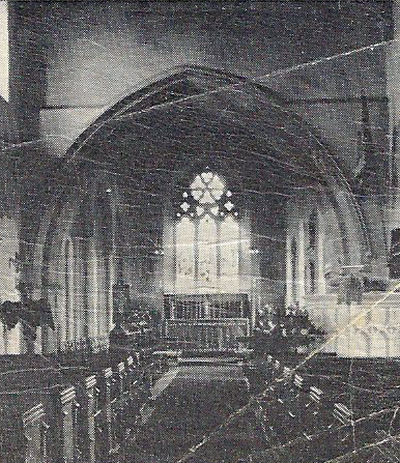
During our youth get-togethers he stood and asked: “All right. Anyone have any problems this week?”
On one occasion a girl who worked at a flower shop confided: “Well, I've been saying that flowers are fresh to the customers in the store where I work, because that's what the boss told me to say, but they're not fresh.”
Reverend Rose said, “You can't lie. If he insists you tell untruths, then you have to leave the job.”
She came back the next week to report, “The owner said that I had to cover for him and say the flowers were fresh, so I quit. The next day I got a new job and it's much better.” I sat enthralled. God stands by those who obey His Word, I thought.
On Saturday mornings the youth of the church gathered at the rectory to play tennis and walk together. After a full day of activity we had a “quiet time” in the evening. We sat in a silent circle and each invited God to speak to us. With pencil and paper in hand we wrote down what the Lord said. After a half-hour of silence, the service was opened for us to share what we felt the Lord had told us. Sometimes we confessed our weaknesses and faults and asked for help. Other times we gave testimonies of what God had done for us that week. We also prayed for one another and were encouraged to write letters to each other if we chose to during the week.
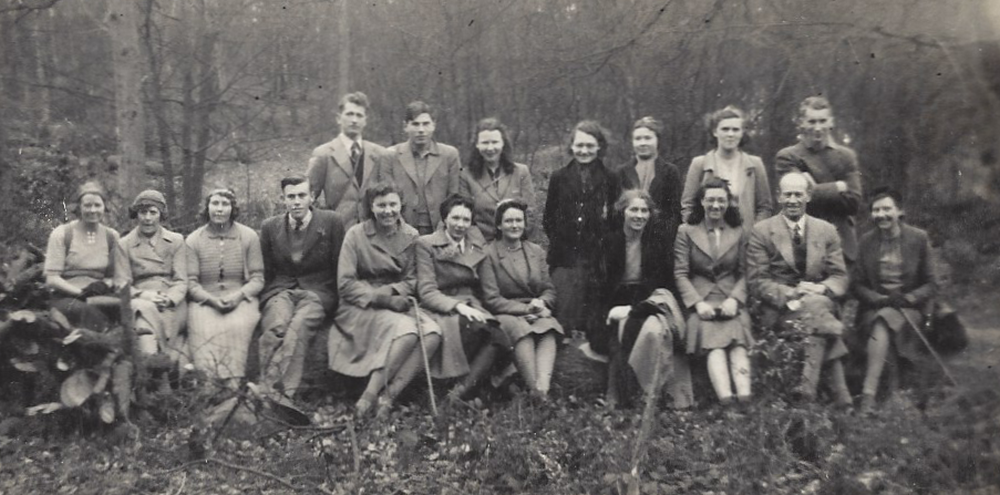
The nations, not having Reverend Rose for their leader, heated up with hatred and talked of war.
Since Mrs. Mason had found personal peace, the impending war news did not bother her. It was business as usual, making new Christian friends and enjoying each other’s fellowship.
A particularly close friend was Dr. Lenanten, a lady physician. One Sunday morning I sat beside her in church since Mrs. Mason had gone to spend the weekend at school with Graham.
The weekly announcements were read: Mrs. Gower had pneumonia and needed prayer; the youth group were going on a picnic the following Saturday morning and everyone was to bring a sack lunch; choir practice was going to be an hour earlier.
The choir then stood up and sang a rousing rendition of “To God be the Glory” which set the atmosphere for one of Reverend Rose’s challenging sermons. He had walked up to the podium and opened his Bible, when a deacon, looking pale and somewhat embarrassed, appeared by Reverend Rose’s side and whispered to him.
All of the color drained from the minister’s face. He turned to us and announced, “We are at war. Let us pray.” There was a gasp from the congregation and we all bowed our heads. His prayer was fervent, “Oh God, help our country in this hour. Give our leaders wisdom. Grant our soldiers courage. Please keep each one of us in the center of Your Will, supporting each other with prayer. Use us for your honor and glory.” As soon as he said “amen,” he dismissed the service.
Dr. Lenanten, a sedate woman in her fifties, jumped up from our pew, grabbed my arm and pulled me through the crowd to her car.
“Hurry, Milly,” she panted. Her hat, unused to its owner’s whirlwind of activity, had slipped to the side of her head. “Bombs could fall any minute!” As soon as the doors of the vehicle closed, she revved the engine and drove as if pursued by hornets.
Contrary to Dr. Lenanten’s fears, bombs did not fall for many months. However, during the days that followed everyone prepared for the impending bombing. Gas masks were issued to everyone. We were required to carry them everywhere we went. Special alarm sirens were installed in each neighborhood, and their signal system was taught. The consensus was, we must band together and win this war. We must do our little part in the body of mankind, to destroy the pathogen that threatened our civilization.
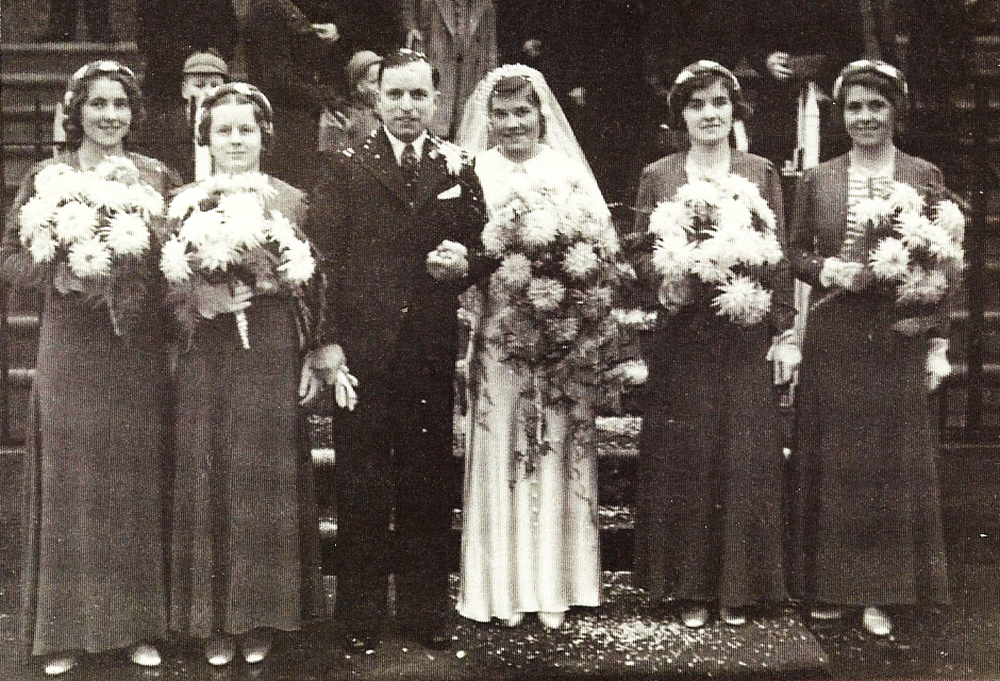
During this time my sister Ruth married a wonderful man named Howard Mash, and a year later gave birth to a baby boy, David. I tried to go to their home as often as I could.
One November afternoon I visited Ruth and played with the baby. As he sat in his bath water I remarked, “Oh Ruth, he is so precious! Listen to him coo! It sounds like music!” He then gurgled and splashed the water with his little fists.
“If you watch him, Milly, I’ll get you another cup of tea,” she volunteered, as I tickled baby David’s foot.
“No more tea, Ruth, thank you. I’ve got to get back to Mrs. Mason’s.”
Just then the neighborhood siren sounded. We had been taught to listen for several different sounds. One blast meant for us to put on gas masks. Completely taken by surprise, we looked at each other speechless for a second. Then I shouted, “Oh, Ruth! That one blast means we’re going to get bombed!”
She grabbed David and ran to get her gas mask. Since mine was beside my purse, I snatched it and followed her to the cupboard under the stairs. The siren wailed forlornly as we squeezed into the tight space. David sensed our fear and began to cry. Suddenly, accompanying the noise, I heard a shrill whistle.
“What’s that?” I asked.
“That’s the whistle guard,” she shouted over David’s screams. ”He’s supposed to walk around the neighborhood and be sure everyone has found protection.”
“What about HIS protection?”
Before Ruth had time to answer we heard thunder-like crashes. We started to pray for ourselves, for our loved ones in the other parts of the city, and for the whistle guard. As moments went by in a nightmare of shrieks and crashes, we were able to distinguish between the booms of the anti-aircraft guns and the rumble of the enemy’s planes and bombs. Ding! Ping! We heard shrapnel rain down on our roof when a big shell burst above our area.
The bomb must be right over us, I thought as the house shook. Then a hymn came to my mind,
I was at peace wondering which breath would be our last.
An hour later, the siren began to blow a steady pitch. It was an “all clear.” The enemy had done its damage and was gone.
However, at first our legs refused to move from their cramped position. David clung to Ruth as we walked through the house and outdoors surveying the damage. We watched burning paper fall from the sky and cinders float through the air. A huge clean-up job was now all around us.
“Oh Ruth! I hope Mummy and Daddy are all right.” I was so concerned that I made a special trip to see them on Sunday.
I found everyone fine and busy. Gladys was at work in a hospital; Elsie was a cook for the fire brigade; Grace was occupied with Mrs. Darby who had developed a heart problem and needed constant care.
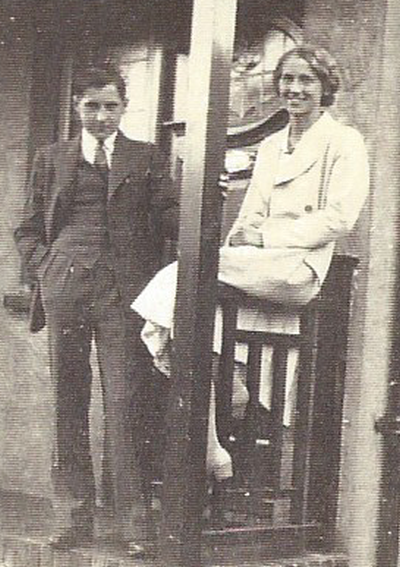
My brother, John, was employed at the airport. He explained that his group was being evacuated to Wales. “Milly,” he asked, “will you come with me to look at the airport damage?”
A walk with him meant that I would miss church, but I agreed, “Sure, let’s go. We might not get another chance to be together for a while.”
We walked the two miles to the airport enjoying our time alone to share with each other.
“Oh, Johnny, look!” I had suddenly seen what once had been an airport. I gasped in horror as I surveyed the scene.
“Terrible! Imagine, if I had been here.” Johnny’s eyes widened. “Look, over there! I used to work on the top floor of that gutted building.”
Farther ahead, a tank was rolling toward us. A man shouted from the turret, “Find shelter! The Germans are coming!” We looked up and saw a gray cloud of planes in the distance. “Run! Run!”
We grabbed hands and ran for our lives, reaching town just as full churches emptied into the street. A bus had stopped and we pushed our way into it with the crowd. The driver revved the engine and screeched onto the road. We climbed the bus stairs to the top open deck to watch breathlessly as the planes bore down. Soon they were overhead. A child peered out from a shelter along the road. He was a neighbor boy. Later that day I heard he had been killed, his head severed from his body when a bomb hit right above him.
Suddenly the bus shook from the explosion of a bomb. The driver stopped the bus. ”Everyone out! I can’t go any farther!”
The fumes, acrid dust and smoke blocked our visibility to know where to run, but miraculously we found our way into an air raid shelter. I trembled uncontrollably and told Johnny, “I won’t ever miss another Sunday service!”
Following this Sunday afternoon close call, Mrs. Mason and I spent many nights under the dining table with the piano to the side of us. “Oh, Mrs. Mason, how long will this awful war last?”
“I don’t know, Milly, but I’m certainly glad to have peace in my soul even though there is chaos around me.” She was smiling, and I agreed that there was more than one kind of war.
Within a few months I received notice from the government that I must be actively involved in the war effort. A housemaid for the wealthy was not considered essential. Of course, Mrs. Mason was very upset, but the government notice was clear.
“What shall I do, Reverend Rose?” I asked.
“Well, Milly, have you ever had any desires to do anything besides housekeeping?”
I thought a moment. “Yes, ever since Mummy gave birth to my brother Johnny with that alcoholic midwife, I have dreamed of what help a good nurse could be.”
“Nursing would be something that the government would agree to, I’m sure,” he confirmed.
“But how do I know it’s what God wants me to do?” I asked.
“God puts desires in our hearts, Milly, and as long as they are not contrary to His Word, we can proceed, and if it is truly His will, He will work out the details.”
Before many days passed I was packed and moved to Redhill Hospital ready to start my first year of nurse’s training.